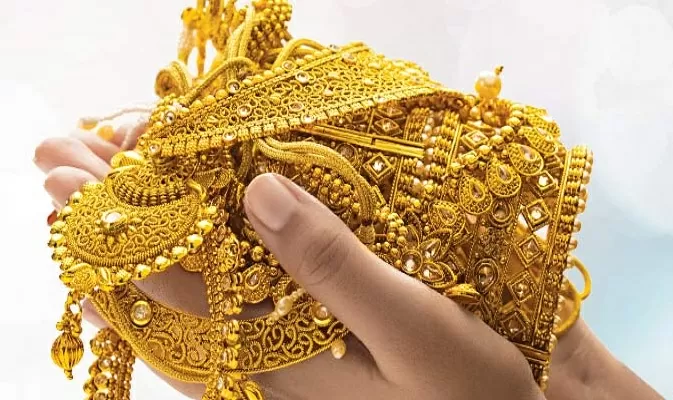The question still arises that can you not keep jewellery above this limit? According to the rules, if you keep jewellery above the limit, the Income Tax Department can ask you about its source. If you provide complete details about this, then this jewellery should not be seized during the raid.
If we talk about women’s most favourite thing, then undoubtedly the first name that comes to mind is gold jewellery. In such a situation, the question arises whether there is any fixed limit for this? Can the Income Tax Department take action against you if you keep jewellery above a certain limit? So let us tell you that the Central Board of Direct Taxes (CBDT) has fixed its limit in a circular.
According to the rules, a married woman can keep 500 grams of gold jewellery. For an unmarried woman, this limit is 250 grams. In the case of men, the situation is a little clearer. Whether married or unmarried, this limit has been fixed at 100 grams for each member of the family. That is, if the Income Tax Department raids, gold jewellery up to this amount cannot be confiscated.
Particulars | Limit per person |
Married woman | upto 500 gms |
Unmarried woman | upto 250 gms |
Men | upto 100 gms |
| Hindu Undivided Family (HUF) | As per household income |
Also Read- New Vande Bharat Train: Good news for the passengers! Three new Vande Bharat train will run on this routes; Check routes & details
Income Tax on Sale of Gold
Particulars | Short Term | Long Term |
Period of Holding | 24 months or less | More than 24 months |
Tax Rate | Slab Rate | 12.5% |
Is indexation Available? | No | No |
Computation of Capital Gains | Sales Price (-) Cost of Acquisition (-) Transaction cost | Sales Price (-) Cost of Acquisition (-) Transaction cost |
If gold is acquired before January 1, 2001, the Cost of Acquisition of such gold will be higher of:
(i) the Actual Cost of acquisition of gold or
(ii) the Fair market value of gold as of January 1, 2001.
An exemption of Rs. 1,25,000 on LTCG will be available if the gain is a result of Gold ETFs or Gold MFs.
Tax Implications on Seizure of Gold
When such gold jewellery and ornaments are seized, the assessee must explain the legitimacy and source of income for making such investments along with the proof of making such investment, such as:
- A tax invoice for the purchase of gold or
- Transaction representing the transfer of money through recognised banking channels;
- In the case of inheritance, it can be an original invoice in the name of the first recipient, a will or family settlement agreement, or
- In the case of a gift, it can be an original invoice in the donor’s name or a gift deed.
- If the assessee fails to offer an explanation or the reason provided is not satisfactory, the amount of such gold is taxable at the stipulated rate of 60% + 25% surcharge plus a 4% cess, making the tax rate 78%. Additionally, a 10% penalty is also payable over and above such tax.
Also Read- Indian Railways Waiting Tickets Rules : Attention Passengers! Railway issued a big order regarding waiting ticket, Check immediately
Income Tax on Gold Jewellery/Bullion/Gold ETFs/ Gold MFs Received as a Gift
If you receive gold jewellery/bullion/Gold ETFs/Gold MFs as a gift, the entire market value of gold received is taxable if it exceeds Rs 50,000 in a year. Based on your income bracket, it is taxed at slab rates under the heading ‘Income from other sources’.
Nonetheless, the Act grants tax exemptions in the following circumstances where the gift will not be taxable:
- If the total amount of gold you get as a gift in a year does not exceed Rs 50,000 or
- If the gifts come from the family listed below:
- Parents and Siblings
- Spouse – Brother or sister of your spouse
- Your/your spouse’s ancestor or descendent (e.g. children, parents, grandparents, etc.)
- Gold received on the occasion of your marriage
- Gold inherited under a will
- GST on Purchase of Gold
- GST is levied at 3% on gold purchases and 5% on making charges for the gold ornaments.
- If you trade gold (say, bars or coins) for new jewellery, no GST is imposed up to the weight of the gold swapped. Just the value of excess weight is subject to GST.
- However, no GST would be levied on the sale of gold by individuals. For details refer article.
Tax and investment expert Balwant Jain says that CBDT’s circular has made it clear that gold up to the prescribed limit will not be confiscated, irrespective of the family’s income. In case of income tax raid, the jewellery up to the prescribed limit will be separated. The income tax department can take only the remaining jewellery with it.
The question still arises that can’t you keep jewellery beyond this limit? According to the rules, if you keep jewellery beyond the limit, the income tax department can ask you about its source. If you provide complete details about this, then these jewellery should not be seized during the raid.
However, it is not that you will not be questioned if you keep jewellery up to the prescribed limit. According to the rules, you may have to give details of the source of the money raised to buy the jewellery found within the limit during the raid. In such a situation, it is important that whenever you buy jewellery, keep its receipt safe with you. Apart from this, it will be in your interest to keep the receipts of payment of making charges of new jewellery safe.

